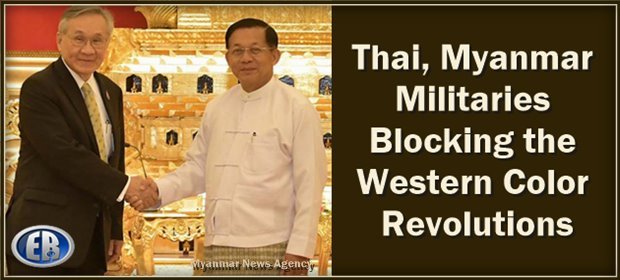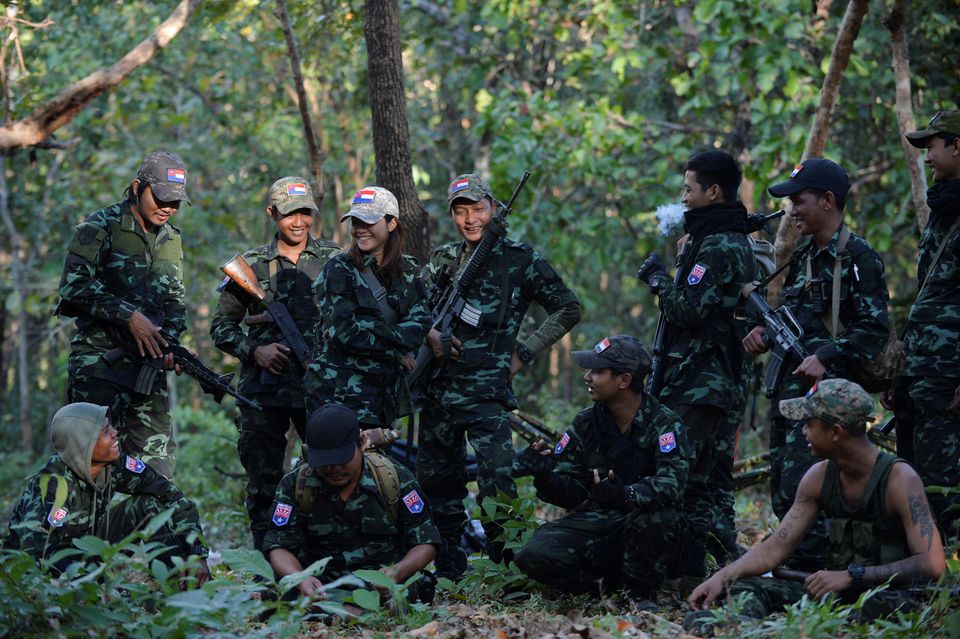
ER Editor: Myanmar is an interesting country with current relevance. The cute, photogenic Aung San Suu Kyi was a George Soros, Hillary Clinton color revolution product. In 2020, they had a election stolen through fraud (!!), and the military subsequently ousted Suu Kyi, arresting her on particular charges. Doesn’t this all seem familiar? It appears that many Asian countries, of which we have a poor impression in the West, are susceptible to precisely the same cabal-globalist forces as we are in the West. Analyst and former diplomat M.K. Bhadrakumar makes a similar point below.


What Bhadrakumar’s analysis reveals is the militaries of both Myanmar and Thailand being in charge, treading somewhat carefully, and finding cabal-influenced opposition within traditional large-scale organisations such as ASEAN. Yet these militaries are not going to back down. Are these defiant militaries facing down the cabal on behalf of their countries? It would seem so. And how many countries are ACTUALLY doing this, not simply a handful that make the news?
We simply don’t understand Bhadrakumar’s final point, which seems to put the Myanmar military and Soros-sponsored Aung San Suu Kyi on the same side. This is incomprehensible, according to everything we’ve published. We remind readers that they arrested her back in 2020.
All in all, the Thai and Myanmarese militaries seem to be on the same page, probably with Beijing’s backing since they are treating China as an ally. When we say China, we mean that which is not controlled by the CCP, an oppressive globalist creation. From what we’ve heard rumoured about Xi, Putin and Trump working together, it would seem these militaries are on the right side of history.
********
Wheel has come full circle in Myanmar
M.K. BHADRAKUMAR
Aung San Suu Kyi, the iconic figure of Myanmarese politics, has been moved from prison to house arrest. This may seem a baby step, but make no mistake, the journey of a thousand steps begins with one step, as the ancient Chinese philosopher Lao Tzu had said.
 Guerrilla fighters, trained, equipped and financed by Western intelligence to overthrow military rule in Myanmar (File photo)
Guerrilla fighters, trained, equipped and financed by Western intelligence to overthrow military rule in Myanmar (File photo)
This development signifies stirrings in the air, a willingness to explore dialogue, and must be welcomed by neighbouring countries — in particular, India, China and Thailand.
If the past is any guide, the military leadership in Myanmar has either been talking to Suu Kyi behind the scenes or is hoping to re-engage her in a meaningful conversation. The fact that Thailand’s foreign minister Don Pramudwinai paid a secret visit to Nay Pyi Taw (ER: the capital of Myanmar) three weeks ago and met with Senior General Min Aung Hlaing and Suu Kyi in prison suggests pivotal undercurrents.
Don travelled on a special military plane. Evidently, the powerful Thai military was on board, which is only to be expected as the generals in Bangkok are also locked in an existential struggle of sorts with the very same western powers who are igniting a guerrilla war in Myanmar.
The paradox is, Western intelligence agencies are fuelling an armed rebellion against the Myanmarese generals in power from the hideouts in Thailand while also promoting a colour revolution and regime change in Thailand itself. The Myanmarese and Thai militaries traditionally kept close fraternal ties.
Don described his trip to Nay Pyi Taw as “an approach of the friends of Myanmar, who would like to see a peaceful settlement”. Interestingly, his trip took place just days before the ASEAN foreign ministers meeting in Jakarta on July 11-12. The timing suggests that Don’s mission provided a vital input for the ASEAN deliberations on Myanmar.
The ASEAN faces a Hobson’s choice (ER: this usually means ‘no choice’). To reconcile with the military coup in Myanmar is a bitter pill to swallow. On the other hand, the western pressure to isolate Myanmar is a road to nowhere; the generals in Nay Pyi Taw simply hunkered down. And in the process, ASEAN unity got eroded.
The ASEAN cannot be unaware that it is in Washington’s crosshairs, since the group stubbornly refuses to take sides in the US’s rivalry with China. The QUAD members once swore passionately by “ASEAN centrality,” but today a fragmented ASEAN suits US interests in the Indo-Pacific — ‘you are either with us, or against us.’
All these subplots make the geopolitics of Myanmar very complex. But it is possible to be cautiously optimistic. Importantly, the joint communique issued after the ASEAN foreign ministers meeting avoided polemical references to Myanmar and even complimented the authorities in Nay Pyi Taw over their implementation of the pilot repatriation project with Bangladesh to facilitate 7,000 Rakhine refuses to return by the end of this year.
The ASEAN joint communique stated:
“We reaffirmed ASEAN’s continued support for Myanmar’s efforts to bring peace, stability, the rule of law, promote harmony and reconciliation among the various communities, as well as ensure sustainable and equitable development in Rakhine State…
“We discussed the developments in Myanmar and reaffirmed our united position that the Five-Point Consensus (5PC) remains our main reference to address the political crisis in Myanmar. We strongly condemned the continued acts of violence, including air strikes, artillery shelling, and destruction of public facilities and urged all parties involved to take concrete action to immediately halt indiscriminate violence, denounce any escalation, and create a conducive environment for the delivery of humanitarian assistance and inclusive national dialogue.” [Emphasis added by author.]
The ASEAN didn’t openly identify with Don’s trip to Myanmar but, significantly, the joint communique made it a point to mention that “a number of ASEAN member states viewed as a positive development” the initiative by Thailand, without elaborating or specifying which states were in support.
Equally significant, Indonesia, Singapore and Malaysia, which are known to have taken a strong stand against any engagement with Nay Pyi Taw that could be perceived as recognising Myanmar’s top generals as legitimate leaders, piped down their rhetoric. The Indonesian Foreign Minister Retno Marsudi, host of the summit in Jakarta, avoided commenting on Don’s meeting with Suu Kyi.
Meanwhile, the military leaders in Nay Pyi Taw are watching keenly the political developments in Thailand, which point toward emasculating the colour revolution sponsored by the West.
The Thai military is making sure that Pita Limjaroenrat (ER: image search), a rich playboy retreaded through Harvard University and pitchforked to the vanguard of the colour revolution in Bangkok will not get the requisite majority support in the parliament to form a government.
Pita’s electoral alliance is unravelling, leaving him in limbo. The second biggest constituent of his electoral alliance, Pheu Thai party, is seeking a modus vivendi with the politico-military establishment in Bangkok (backed by the monarchy) to work out a power-sharing arrangement that nips in the bud Washington’s best-laid plans to turn Thailand into a vassal state an anti-China base — an Ukraine in Asia on China’s doorstep.
Pita had made it abundantly clear that once in power, he would do all he could to evict the generals in power in Myanmar. Indeed, the Western strategy is to turn Thailand into a staging post to destabilise the countries along China’s “soft underbelly” — Vietnam, Laos, Cambodia and Myanmar. Washington pinned high hopes on Pita, who also possesses, curiously, the communication skills comparable to Ukraine’s Zelensky.
However, the Thai military is digging in, with support from the monarchy (ER: a reminder that one of the Thai royal family daughters, Princess Bajrakitiyabha Mahidol, was severely injured and possibly killed by a Pfizer Covid vaccine – news has gone quiet about this but Benjamin Fulford has revealed that the Thai royals won’t take it lying down), to thwart the Western game plan to “lock in” their country as a base camp of the Indo-Pacific strategy to encircle China. The heart of the matter is that although the US-Thai alliance is decades-old and served mutual interests, times have changed, and today, the two countries share few strategic interests.
Relatedly, the military-backed elites in Bangkok are interested in closer ties with Beijing, whom it sees as a more reliable defence and economic partner. A strategic drift has been building up over the recent decades and Thailand no longer shares strategic interests with the US.
Perceptions changed in 1998, when the US failed to bail out Thailand during the Asian economic crisis. Thailand does not view China as a revisionist power or a military threat. Instead, Bangkok considers Beijing as the country’s largest economic partner, and an ally. Succinctly put, American and Thai strategic concerns are sharply out of alignment.
Suffice to say, the political developments in Thailand and Myanmar are intertwined. The Thai establishment’s advice to the Myanmarese generals would be, conceivably, to “weaponise” electoral politics as they are doing in Bangkok and defang and assimilate the opposition, so as to keep the wolves away. It seems the generals in Nay Pyi Taw heeded Don’s message.
The ASEAN too is not wanting matters to be taken to a point of no return and will be quietly pleased that Don’s consultations broke the political stalemate in Myanmar. After all, both the Myanmarese military leadership and Suu Kyi are staunch nationalists (ER: Suu Kyi? we doubt that. Why did they have her arrested?) and cannot be happy with the state of their beloved country becoming prey to predatory foreign powers.
Suu Kyi’s absence worked well for the western proxies to try to usurp the democratic leadership in the country. Her return poses a dilemma for the Western powers. (ER: Again, for reasons we’ve published, this doesn’t seem likely)
Source
************

••••
The Liberty Beacon Project is now expanding at a near exponential rate, and for this we are grateful and excited! But we must also be practical. For 7 years we have not asked for any donations, and have built this project with our own funds as we grew. We are now experiencing ever increasing growing pains due to the large number of websites and projects we represent. So we have just installed donation buttons on our websites and ask that you consider this when you visit them. Nothing is too small. We thank you for all your support and your considerations … (TLB)
••••
Comment Policy: As a privately owned web site, we reserve the right to remove comments that contain spam, advertising, vulgarity, threats of violence, racism, or personal/abusive attacks on other users. This also applies to trolling, the use of more than one alias, or just intentional mischief. Enforcement of this policy is at the discretion of this websites administrators. Repeat offenders may be blocked or permanently banned without prior warning.
••••
Disclaimer: TLB websites contain copyrighted material the use of which has not always been specifically authorized by the copyright owner. We are making such material available to our readers under the provisions of “fair use” in an effort to advance a better understanding of political, health, economic and social issues. The material on this site is distributed without profit to those who have expressed a prior interest in receiving it for research and educational purposes. If you wish to use copyrighted material for purposes other than “fair use” you must request permission from the copyright owner.
••••
Disclaimer: The information and opinions shared are for informational purposes only including, but not limited to, text, graphics, images and other material are not intended as medical advice or instruction. Nothing mentioned is intended to be a substitute for professional medical advice, diagnosis or treatment.





Leave a Reply